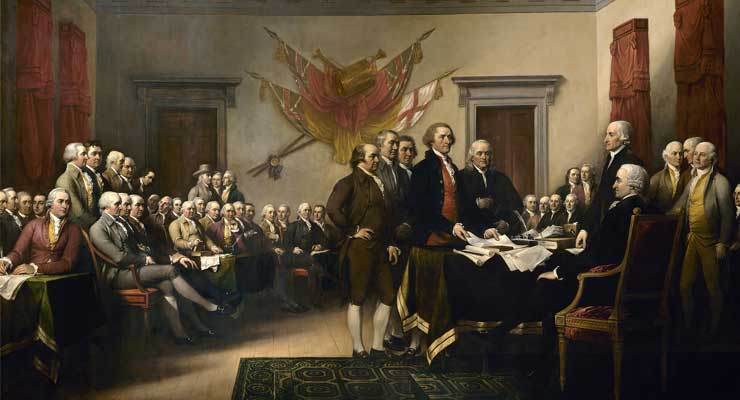
Sixth in a series of ten posts on MLK.
And I knew that as they were sitting in, they were really standing up for the best in the American dream. And taking the whole nation back to those great wells of democracy which were dug deep by the Founding Fathers in the Declaration of Independence and the Constitution.[1]
King’s historical memory found the roots of revolution in the best of American political traditions. The student led sit-in movement renewed the civil rights struggle and launched the student movement. Reflecting on that King said,
Thus was born—particularly in the young generation—a spirit of dissent that ranged from superficial disavowal of the old values to total commitment to wholesale, drastic and immediate social reform. Yet all of it was dissent….This dissent is America’s hope. It shines in the long tradition of American ideals that began with the courageous minutemen in New England, that continued in the abolitionist movement, that reemerged in the populist revolt and decades later, that burst forth to elect FDR and JFK.
Today’s dissenters tell the complacent majority that the time has come when further evasion of social responsibility in a turbulent world will court disaster and death. America has not yet changed cause so many think it need not change, but that is the illusion of the damned. America must change because twenty-three million black citizens will no longer live supinely in a wretched past. They have left the valley of despair; they have found strength in struggle; and whether they live or die, they shall never crawl or retreat again. Joined by white allies, they will shake the prison walls until they fall. America must change.[2]
This is a powerful revolutionary vision; this resonates with struggles launched by Occupy, Ferguson, the Fight for 15, and Idle No More. It also resonates with the illusions that avoid confronting the environmental crisis.
 King’s revolutionary vision drew power by fusing radical dissent with our historical roots. Deep history allows for a playful and productive relationship between change and continuity. Great changes need occur but change can be understood as keeping true to the original promise of the American revolution.
King’s revolutionary vision drew power by fusing radical dissent with our historical roots. Deep history allows for a playful and productive relationship between change and continuity. Great changes need occur but change can be understood as keeping true to the original promise of the American revolution.
Essential to making this historical bridge to the revolutionary past compelling was King’s insistence that American traditions were a sacred promise sworn but as yet unfulfilled.
For in a real sense, America is essential a dream, a dream yet unfulfilled. It is a dream of a land where men of all races, of all nationalities and all creeds can live together as brothers. The substance of the dream is expressed in these sublime words, lifted to cosmic proportions:” We hold these truths to self-evident that all men are created equal that they are endowed by their creator with certain unalienable rights, that among these are life, liberty and the pursuit of happiness.’ This is the dream.”[3]
King yearned for the day that the America could exert real leadership—leadership by example. King urgently insisted that revolution was achievable in this world and in our time. That however would take a revolution of values and yes, it will mean working long and hard with “bruised hands.” In Where Do We Go From Here: Chaos or Community? King wrote:
America, the richest and most powerful nation in the world, can well lead the way in this revolution of values. There is nothing to prevent us from paying adequate wages to schoolteachers, social workers and other servants of the public to insure that we have the best available personnel in these positions which are charged with the responsibility of guiding our future generations. There is nothing but a lack of social vision to prevent us from paying an adequate wage to every American citizen whether he be a hospital worker, laundry worker, maid or day laborer. There is nothing except shortsightedness to prevent us from guaranteeing an annual minimum—and livable—income for every American family.
There is nothing, except a tragic death wish to prevent us from reordering our priorities, so that the pursuit of peace will take precedence over the pursuit of war. There is nothing to keep us from remolding a recalcitrant status quo with bruised hands until we have fashioned it into a brotherhood.[4]
By embedding the social movements into the promises and ideals drawn from the American past King was able to teach revolution as affirmation not repudiation, as constructive not destructive, as something real — right here, right now.
The real America is still being brought into being by the social movements. Here is a revolution that recalls the best in the American tradition. A revolution that already has a foothold in the hearts and minds of everyday Americans. This is a revolution we can make. This is a revolution we can win.
All citations are from, A Testament of Hope. [1] I See the Promised Land 286. See also 165, 302. [2] A Testament of Hope, 327-328 [3] The American Dream, 208. See also 89, 105 [4] Where Do We Go From Here? Chaos or Community, 631. See also 526.
Leave a Reply